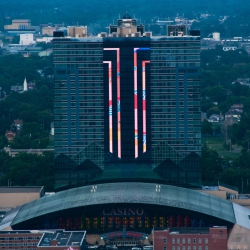The Niagara County Legislature passed two resolutions on Oct. 17 calling for Gov. Andrew Cuomo to settle a dispute with the Seneca Nation over gaming compact revenues. While the dispute continues, the Seneca Nation is not paying revenues to the county or the city of Niagara Falls.
The legislature met this past week to pass resolutions calling for Cuomo to take actions to “rapidly resolve the dispute”. Neither resolution offers recommendations on how to resolve the standoff, which has continued for seven months.
Randy Brandt, the Majority Leader on the Niagara County Legislature, said prior to Tuesday’s vote, “We’re basically asking Gov. Cuomo to take the head on this and bring this to a [resolution].”
Seneca Nation Froze Casino Payments
While the dispute continues, the Seneca Nation suspended casino revenue payments. Over the past few years, Niagara County has received $800,000-a-year in casino payments. 75% of that cash was applied towards property tax relief. The remaining 25% went to support community development from Somerset to Wheatfield.
The payments continue to go to an escrow account, but the city and county cannot access those payments. Thus, they are left without a key source of income that each has come to depend upon.
Niagara Falls County Lost $470k
With the dispute now continuing for 7 months, the county has lost about $470,000 in payments for the year. That revenue loss is starting to be felt by the county, which could not have predicted such an impasse. Eventually, property taxes will reflect the lost revenue, so Niagara County leaders passed the measures to either end the dispute, or signal to their constituents they did their part to bring the impasse to an end.
The City of Niagara Falls is feeling the effects of the dispute far worse than the county. Niagara Falls receives about $20 million a year from the Seneca Nation’s casino gaming operations, a number which simply cannot be replaced quickly by a city with a population around 50,000 (on the American side of the border). The city of Niagara Falls disburses some of that money to smaller nearby communities, so a wide swath of small towns feel the effects of the dispute.
Finger Lakes Casino
In September 2017, the State of New York formerly declared the Seneca Nation in breach of its 2002 gaming compact. That compact granted the Seneca Nation exclusive rights to operate casinos in Western New York. The Seneca Nation operates three land-based casinos in Western New York, including one in Niagara Falls. The Seneca Nation believes the state’s decision to approve a new casino in the Finger Lakes area is a violation of that agreement.
The Del Lago Resort & Casino near Waterloo in the Finger Lakes region is a sore point for the Seneca. It sits just outside an agreed-upon 16-county exclusion zone in the 2002 gaming compact. Though Del Lago is not technically a breach of the deal, the Seneca Nation sees it breaking the spirit of the deal.
How Arbitration Works
Gov. Andrew Cuomo hopes that arbitration will settle the dispute. After declaring the Seneca Nation in breach of its compact, the New York state government filed for binding arbitration. The arbitration process could take numerous months to resolve the dispute — and possibly more.
Under arbitration, both sides would make arguments before a third-party arbitrator the State of New York and the Seneca Nation would agree upon. Whatever decision was made, though, could be appealed to a federal court. No one is under any illusion that the losing side in arbitration would not appeal that decision, so arbitration would take many months to complete.

